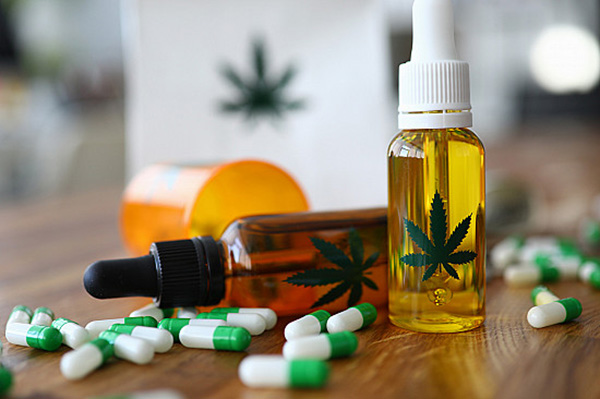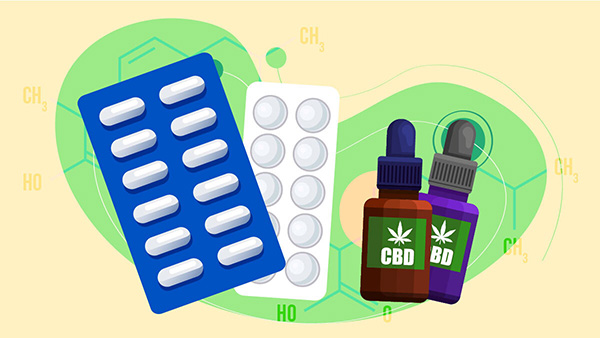Which is Better for Pain Control? CBD or Ibuprofen.

Which is Better for Pain Control? CBD or Ibuprofen.

Although Ibuprofen is a very effective treatment, it carries with it several risks that affect a significant number of users. These side effects are much more common than those from CBD use.
Pain is a natural occurrence and is part of the body's response to healing. It is how our bodies notify us that something is wrong. However, sometimes it can become too much, and we need painkillers to control it.
Ibuprofen is one of the most effective medications for chronic pain symptoms such as headaches, toothaches, and back pain. More than 50 percent of the U.S. population has used Ibuprofen. Unfortunately, it can sometimes bring side effects.
With the newly tested and proven therapeutic effects of cannabidiol (CBD) compounds, CBD is emerging as a promising way to treat pain. However, CBD has not yet been approved for medical use.
CBD has gained popularity for its fascinating effects as a natural supplement. What is even more appealing is that, according to the studies conducted, it appears to have no severe side effects.
CBD VS ibuprofen

It's time to compare the two compounds to examine whether the all-natural wonder drug called CBD is sufficient to replace Ibuprofen as the analgesic drug of choice.
The source of the CBD
Cannabinoids like CBD are extracted from the hemp plant. There are different extraction methods, but the standard practice is to use a solvent such as ethanol or carbon dioxide for extraction. After extraction, CBD molecules are converted into topical, oil, or capsule gel forms.
The source of Ibuprofen
The drug was developed from propionic acid. The fatty acid is used in the laboratory for its antibacterial properties.
How CBD works
When ingested, CBD raises natural endocannabinoid levels. The endocannabinoid system (ECS) is its main point of contact in the body. The system is a network of receptors found around the body and brain. It balances functions such as immune responses, sleep, appetite, and pain.
CBD relieves pain by activating and promoting the production of CB2 receptors in the ECS.
Some researchers say several conditions, such as migraines, irritable bowel, and fibromyalgia, are caused by an endocannabinoid deficiency.
Cannabinoids work with other body organs to control pain, regulate pain thresholds and slow the production of inflammatory particles.
How Ibuprofen works
Ibuprofen is a Non-steroidal anti-inflammatory drug (NSAID). It works by slowing the production of prostaglandins when the body suffers internal or external injuries.
Prostaglandins are hormones that cause pain and swelling.
Prostaglandin hormones are produced by an enzyme called cyclooxygenase, also known as COX.
Ibuprofen inhibits the production of the enzymes COX-1 and COX-2. In addition, recent studies have shown that Ibuprofen also stimulates endocannabinoids, called anandamide, to reduce pain and increase endocannabinoid levels.
In short, Ibuprofen, like other NSAIDs, fights infection or injury by reducing the activity of chemicals produced by the body.
It is important to note that Ibuprofen is a non-selective COX inhibitor. This means it causes more side effects than other NSAIDs.
The benefits of the CBD
According to the researchers, CBD has properties needed to help relieve pain associated with joint, muscle, and nerve pain, inflammation, chronic migraines, old injuries, cancer, back pain, rheumatoid arthritis, and osteoarthritis, among other conditions.
In addition to this, cannabinoids have the potential to treat insomnia, mental disorders, psoriasis, seizures, acne, and other conditions.
The benefits of Ibuprofen
Ibuprofen is an FDA-approved drug for treating mild to severe pain, swelling, inflammation, and fever.
It's affordable and widely available. Pharmacies have Ibuprofen in stock at all times. The minimal dose of these NSAIDs can provide relief to users.
Not only is it often prescribed as a painkiller, but it also helps prevent the formation of blood clots in certain diseases. Doctors also write prescriptions for musculoskeletal injuries and fevers.
Side effects of CBD
Side effects from CBD use are rare. Due to its non-psychoactive nature, it is generally safe. It is improbable that you could overdose on CBD products.
Researchers have not yet determined a recommended dosage for CBD products, mainly because it has not yet been approved by the Food and Drug Administration.
If you are in a small group of consumers who may experience side effects, these include drowsiness, dizziness, dry mouth, heartburn, and nausea.
However, these side effects only occur when the product is overused, which is more reason to start slowly with a lower dose.
Side effects of Ibuprofen
While Ibuprofen is highly effective, it carries several risk factors that affect a significant number of users. Even short-term use of Ibuprofen is enough to increase the risk of cardiac arrest and stroke in users, the FDA said. Some side effects include:
dizzy
nausea
vomiting
Have a headache
diarrhea
Abdominal distension
heartburn
The rash
constipation
tinnitus
blister
A blurry vision
In extreme cases, prolonged use of high doses of drugs may lead to;
Stomach bleeding
ulcer
A stroke
Kidney or liver failure
hypertension
Asthma attacks
Heart disease
We must point out that the recommended maximum dose of Ibuprofen is 1200mg daily.
Older people are generally discouraged from using it. Ibuprofen is estimated to cause at least 3,000 deaths a year in this age group.
Is combining the two a bad idea?
Combining CBD with Ibuprofen isn't a bad idea, according to research. Studies have shown that the two compounds can be mixed without side effects. It depends on the user's tolerance and sensitivity to the two drugs.
Not all NSAIDs can be used in combination with CBD. Especially naproxen and celecoxib; Mixing any of these with CBD can be serious.
Always talk to your doctor before mixing Ibuprofen and CBD. This is because although there is no proven interaction between the two drugs, your body may have a personal reaction.
Conclusion
For FDA approval of CBD as a painkiller, additional studies will be conducted to fully understand the complexity of ECS and its interaction with CBD.
Until then, exercise caution - only buy your products from trusted sources.





